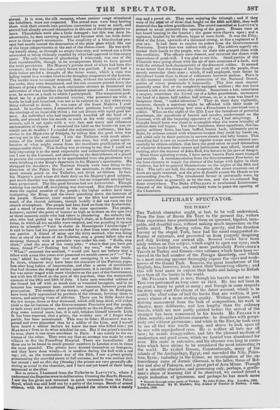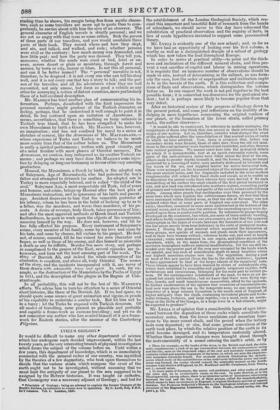LITERARY SPECTATOR.
THE TURKS.*
THE Turkish character ought, at last, to be well understood. From the time of Baron BE TOTT to the present day, writers from experience have proclaimed them an ignorant, bigoted, inca- pable, and deceitful race, without making much impression on the public mind. The flowing robes, the gravity, and the drunken bravery of the stupid Turk, have had the usual exaggerated in- fluence of externals, and prevented us from properly despising a.nd .duly kicking our ancient ally. Several- works have been lately written on this subject, which ought to open our eyes ; such as the two books before us, and more particularly FONTANIER'S Travels in Turkey and Greece—two volumes which have been viewed in the last number of the Foreign Quarterly, a.nd which in a most amusing manner thoroughly expose the vices and weak- nesses of the Grand Turk. Success, the great touchstone of the English, has, however, lately foiled their plundering efforts • and this will tend more to expose their faults and failings to British eyes than all the books in the world. Mr. FULLERS book is new, though his travels are not so : his Tour was performed as long since as 1818. He has not been in so great a hurry to print as many; and though in some respects his story may want the charm of the latest account, which is in reality the chief value of half the books that are written, it pos- sesses claims of a more sterling quality. Writing at leisure, and deriving amusement from the task of composition, his work is chaster, more deliberate, and less lengthy than the ordinary travels, which are now partly printed before the arrival of the stranger has been announced to his friends. Mr. FULLER is a plain, sensible, and judicious character: he describes with perspi- cuity and without pretension ; and while in the East, he took care to see all that was worth seeing, and strove to look upon all he saw with unprejudiced eyes. He is neither all hate nor all love ; he avoids exaggeration, and hits the pleasant medium of moderation and good sense, which we fancied was abandoned for ever. His route is extensive, and his absence was long in coun- tries which have claims to be considered the most interesting in the world. He visited Greece, Constantinople, many of the islands of the Archipelago, Egypt, and ascended the Nile, Pales- tine, Syria ; including in the former, an investigation of the ex- traordinary ruins of'Jerash (Gerasa), in the latter, those of Bal- bec and also of Palmyra, and a great part of Asia Minor. Though not a scientific character, and possessing only, perhaps, a gentle- man's share of learning (let it be observed, we cannot detect a single indication of ignorance, and perhaps he has much more • • Travels through some parts of Turkey. By John Fuller, Esq. London, 1830. - The Mussulman. By R. Madden, Esq. Author of Travels in Turkey. 3 vols. London, 1830. readmk— than he shows, his margin being free from mystic charac- ters, such as some travellers are more apt to quote than to com- prehend), he carries about with him the eyes of an observer. The general character of English travels is strictly personal; and we are not so angry with that term as some critics. Sink the person of three parts of our travellers, and yoi would annihilate three parts of their book. They record where and how they slept, and ate, and talked, and walked, and rode ; whether persons were civil or the contrary ; how much money was demanded, and how little paid ; and how the party was dressed. They tell you, moreover, whether the roads were good or bad, level or un- even, across desert or plain or mountain, through forest and morass, by town or city, bazaar or khan. Is not this all personal, and can it be better named? The " personar narrative is not, therefore, to be despised : it is not every one who can tell his story well, and it is not every one that has a story to tell ; and the per- son of the traveller, and all his adventures when they are well recounted, not only amuse, but form as good a vehicle as any other for conveyinga notion of distant countries, more particularly those of a half-civilized description. Mr. MADDEN has tried another plan of communicating his in- formation. Perhaps, dissatisfied with the faint impression his personal narrative might produce of the Turkish character, or feeling, perhaps, that he understood it well enough to paint it in detail; he has ventured upon an imitation of Anastasius. It seems, nevertheless, that there is something so truly unheroic in Turkish true blood, that he has been compelled to make his own Mussulman by birth a Greek. Mr. MADDEN has, however, an imagination ; and has. not confined his novel to a series of sketches of scenery, like the Armenians of Mr. MACFARLANE,— vhose experience of Turks and Turkey we believe to be much more scanty than that of the author before us. The Mussulman is really a spirited performance ; written with great vivacity, out of a mind familiar with most phases of Oriental manners. The Armenians, we confess, long indisposed us for another Turkish ro- mance; and perhaps we may have done Mr. MADDEN some injus- tice by delaying so long our testimony in favour of his very amusing production.
Mourad, the Mussulman, a Greek by birth, is the adopted son of Suleyman, Aga of Bournabashi, who had poisoned the boy's father and attempted to debauch his mother. An adopted son in Turkey is more especially beloved, and is called "the child of the soul." Suleyman Aga, a most respectable old Turk, full of years and honour, and crime, brings up Mowed. after the best plan of Mussulman instruction, and inignorance of his birth and parent- age. Accident discovers to him that the venerable protector of his infancy, whom he has been in the habit of looking up to as to a father, was the murderer, and worse than murderer, of his pa- rents. A desire of revenge, truly Greek, takes possession of him; and after the most approved methods of Greek fraud and Turkish foolhardiness, he goes to work upon the objects of his vengeance, amusing himself by the way. He does not, however, end till he has fully effected his purpose. Every instrument of Suleyman's crime, every member of his family, some by his love and some by his hate, and some by chance, fall victims to his project. He does not, of course, succeed, till he has ruined his own character and hopes, as well as those of his enemy, and dies himself as miserable a death as any he inflicts. Besides this main story, and perhaps in compliment to the genius of the East, several episodes are in- terwoven, and form not the least amusing part of the work. The story ,af Dervish AU, and indeed the whole conception of his character, is excellent, and above all, truly Oriental. The scenes of the story, and the incidents incorporated with it, are many of them drawn; w.t.. admirabk romp and spirit. In such, for ex- ample, as the destruction of the Mamelukes by the Paella of Egypt in 1811, and the description of the plague in the Bagnio at Con- stantinople. In all probability, this will not be the last of Mr. MADDEN'S efforts. We advise him to turn his attention to a series of Oriental short histories, like those of the Dervish Ali. If we had space, we should quote some scenes of great animation and vigour, as proofs of his capability to undertake a similar task. But let him not be in a hurry ; let the Turks be exposed with Turkish decorum. Of all modes of travelling, none present so plausible and probable and capable a frame-work as caravan-travelling ; and yet we do not remember any author who has availed himself of it as a frame- work for Eastern stories, after the manner of the Canterbury Pilgrims.



























 Previous page
Previous page